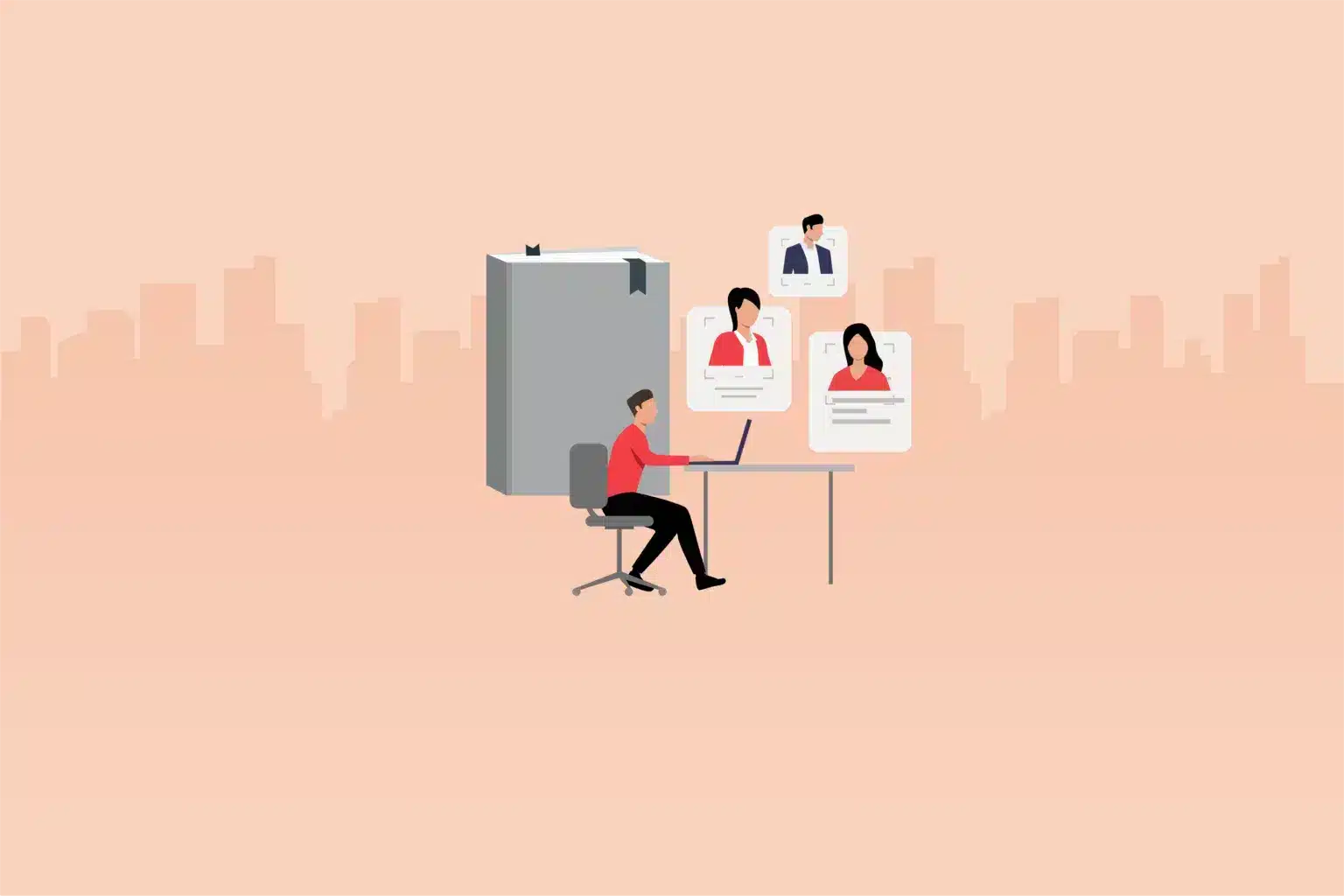In today’s ever-evolving business landscape, the role of an Employee Relations Coordinator has gained significant importance. As organizations strive to foster a positive and productive work environment, the need for skilled professionals to handle employee relations has become crucial. Recent analytics highlight the growing trend of recruiting Employee Relations Coordinators, indicating recognition of their instrumental role in strengthening employee engagement and minimizing workplace conflicts.
This landscape requires HR professionals and CXOs to stay abreast of the evolving strategies and best practices in managing employee relations effectively. In this context, it is essential to equip oneself with insightful interview questions that assess the candidate’s ability to navigate the complexities of employee relations and drive a harmonious work culture.
Here are the top 60 Employee Relations Coordinator interview questions to ask job applicants:
15 general interview questions for the Employee Relations Coordinator
- Can you provide an overview of your experience in handling employee relations issues?
- How do you approach conflict resolution in the workplace? Can you share a specific example of a challenging employee relations issue you successfully resolved?
- What strategies do you employ to promote positive employee morale and engagement within an organization?
- How do you ensure compliance with relevant employment laws and regulations while managing employee relations matters?
- Can you describe your process for conducting investigations into employee complaints or allegations?
- How do you handle situations where there is a clash between an employee’s rights and the company’s policies or objectives?
- What steps would you take to address a toxic work environment and improve employee relations?
- How do you stay updated on current trends and best practices in employee relations?
- Can you explain your approach to fostering effective communication between employees and management?
- How do you address and resolve conflicts between team members or departments?
- Can you discuss a time when you had to handle a sensitive employee relations issue with confidentiality and discretion?
- How do you ensure fair and consistent application of policies and procedures across the organization?
- Can you provide an example of a successful employee relations program or initiative you implemented? What were the outcomes?
- How do you measure the effectiveness of your employee relations efforts?
- How do you handle situations where an employee’s personal beliefs or preferences clash with company values or policies?
5 sample answers to general interview questions for the Employee Relations Coordinator
- Can you provide an overview of your experience in handling employee relations issues?
Look for: A comprehensive understanding of the candidate’s experience in managing various employee relations matters, such as conflict resolution, investigations, policy implementation, and employee engagement.
Sample Answer: “In my previous role as an Employee Relations Coordinator, I handled a wide range of employee relations issues. This included resolving conflicts between employees, conducting investigations into complaints, implementing fair and consistent policies, and designing employee engagement initiatives. For example, I successfully mediated a dispute between two team members by facilitating open communication, understanding their concerns, and finding a mutually agreeable solution that improved their working relationship.”
- How do you approach conflict resolution in the workplace? Can you share a specific example of a challenging employee relations issue you successfully resolved?
Look for: The candidate’s ability to articulate a structured and fair approach to conflict resolution, including active listening, empathy, mediation, and a focus on finding mutually beneficial solutions.
Sample Answer: “When it comes to conflict resolution, I believe in creating a safe and respectful environment for both parties to express their perspectives. I actively listen to understand their underlying interests and emotions and facilitate open dialogue. One challenging employee relations issue I resolved involved two employees who had a communication breakdown resulting in constant clashes. By holding individual meetings with each employee, allowing them to express their concerns, and then mediating a joint discussion, we were able to identify miscommunication issues, establish clear expectations, and foster a more collaborative work relationship.”
- What strategies do you employ to promote positive employee morale and engagement within an organization?
Look for: The candidate’s knowledge of employee engagement strategies, such as recognition programs, feedback mechanisms, professional development opportunities, and fostering a supportive work culture.
Sample Answer: “I believe that positive employee morale and engagement are crucial for a thriving organization. To achieve this, I focus on implementing employee recognition programs, creating feedback channels for employees to voice their opinions, and offering professional development opportunities. For instance, in my previous role, I initiated a monthly ‘Spotlight Awards’ program to recognize outstanding employee contributions, which significantly boosted employee morale and fostered a sense of appreciation within the organization.”
- How do you ensure compliance with relevant employment laws and regulations while managing employee relations matters?
Look for: The candidate’s understanding of employment laws and their ability to implement processes and practices that ensure compliance and mitigate legal risks.
Sample Answer: “Compliance with employment laws and regulations is a top priority for me in managing employee relations matters. I stay updated on the latest changes in employment laws and ensure that policies and practices align with legal requirements. I also collaborate closely with legal counsel to seek guidance when necessary. In my previous role, I conducted regular audits of HR policies and practices to identify any gaps, implemented training programs to educate employees and managers about their rights and responsibilities, and maintained meticulous documentation to demonstrate compliance.”
- How do you measure the effectiveness of your employee relations efforts?
Look for: The candidate’s ability to articulate measurable metrics and methods for evaluating the impact of employee relations initiatives, such as employee satisfaction surveys, turnover rates, productivity metrics, and feedback mechanisms.
Sample Answer: “Measuring the effectiveness of employee relations efforts is essential to gauge the impact of initiatives and make data-driven improvements. I utilize a combination of methods, such as conducting employee satisfaction surveys, analyzing turnover rates and exit interviews, tracking attendance and productivity metrics, and soliciting feedback through regular one-on-one meetings and suggestion boxes. By using these tools, I can identify trends, assess the success of implemented strategies, and make informed adjustments to continuously enhance employee relations within the organization.”
15 behavioral interview questions for an Employee Relations Coordinator
- Tell me about a time when you had to handle a difficult employee relations issue. How did you approach it, and what was the outcome?
- Describe a situation where you had to mediate a conflict between two employees with opposing viewpoints. How did you facilitate the resolution, and what was the result?
- Can you share an example of a time when you successfully implemented an employee engagement initiative? What were the challenges you faced, and how did you overcome them?
- Tell me about a time when you conducted an investigation into an employee complaint or allegation. How did you approach the investigation process, and what actions did you take based on your findings?
- Describe a situation where you had to handle disciplinary action. How did you ensure fairness and adherence to company policies while delivering the disciplinary measures?
- Can you provide an example of a time when you had to address a toxic work environment? How did you identify the issues and take steps to improve the overall work culture?
- Tell me about a time when you had to provide guidance and advice to managers regarding employee relations matters. How did you ensure that they understood their responsibilities and followed appropriate protocols?
- Describe a situation where you had to balance an employee’s individual rights with the needs and policies of the organization. How did you approach the situation to find a resolution that was fair and aligned with company objectives?
- Can you share an example of a time when you successfully implemented policies or procedures to ensure compliance with employment laws and regulations?
- Tell me about a situation where you had to handle a confidential employee relations matter. How did you maintain confidentiality while effectively addressing the issue?
- Describe a time when you had to deliver difficult feedback to an employee. How did you approach the conversation, and what steps did you take to ensure a constructive and productive outcome?
- Can you provide an example of a time when you proactively identified potential employee relations issues and implemented preventive measures to address them before they escalated?
- Tell me about a situation where you had to collaborate with multiple stakeholders, such as HR, legal, and management, to address a complex employee relations issue. How did you effectively coordinate and communicate with the different parties involved?
- Describe a time when you had to deal with resistance or pushback from employees or managers while implementing employee relations policies or programs. How did you handle the resistance and gain buy-in from stakeholders?
- Can you share an example of a time when you facilitated a successful employee feedback or survey process? How did you collect and analyze the feedback, and what actions did you take based on the results?
5 sample answers to behavioral interview questions for the Employee Relations Coordinator
- Tell me about a time when you had to handle a difficult employee relations issue. How did you approach it, and what was the outcome?
Look for: The candidate’s ability to effectively manage a challenging employee relations issue, demonstrate problem-solving skills, and showcase their ability to achieve a positive resolution.
Sample Answer: “In my previous role, I encountered a situation where two employees had a persistent conflict that was affecting their productivity and team dynamics. I approached the issue by first individually meeting with each employee to understand their concerns and perspectives. Then, I facilitated a mediation session where they could openly express their grievances while maintaining a respectful dialogue. Through active listening, empathetic communication, and guiding them toward finding common ground, we were able to reach a mutual understanding and establish a plan for improved collaboration. The outcome was remarkable, as their working relationship significantly improved, resulting in increased productivity and a more harmonious team environment.”
- Can you share an example of a time when you successfully implemented an employee engagement initiative? What were the challenges you faced, and how did you overcome them?
Look for: The candidate’s experience in designing and implementing employee engagement initiatives, their ability to overcome challenges, and the measurable impact of their efforts.
Sample Answer: “During my tenure, I initiated a company-wide employee recognition program aimed at boosting employee morale and engagement. One of the challenges I faced was garnering participation and buy-in from employees across different departments and levels. To overcome this, I developed a comprehensive communication plan that included engaging and informative presentations, email campaigns, and interactive workshops to explain the program’s benefits. Additionally, I worked closely with department managers to ensure they were aligned with the initiative and actively encouraged their teams’ participation. As a result, the program gained widespread adoption, and we observed a notable increase in employee satisfaction scores, as well as a rise in peer-to-peer recognition instances.”
- Describe a situation where you had to conduct an investigation into an employee complaint or allegation. How did you approach the investigation process, and what actions did you take based on your findings?
Look for: The candidate’s knowledge of investigation procedures, their ability to handle sensitive matters with confidentiality, and their commitment to fair and appropriate action based on findings.
Sample Answer: “In a previous role, I received a formal complaint regarding alleged harassment in the workplace. To handle the investigation, I ensured utmost confidentiality and conducted interviews with the complainant, witnesses, and the accused. I carefully documented each interview, maintaining objectivity throughout the process. Once the investigation was complete, I analyzed the evidence, consulted with legal counsel, and presented a comprehensive report to management. Based on the findings, appropriate disciplinary measures were taken in accordance with company policies, ensuring a fair and respectful resolution to the situation.”
- Tell me about a time when you had to handle disciplinary action. How did you ensure fairness and adherence to company policies while delivering the disciplinary measures?
Look for: The candidate’s understanding of disciplinary procedures, their ability to maintain fairness and adherence to policies, and their communication skills in delivering disciplinary actions.
Sample Answer: “In my previous position, I encountered a situation where an employee repeatedly violated company policies, warranting disciplinary action. To ensure fairness, I meticulously reviewed the policies, gathered all relevant evidence, and conducted a thorough investigation to corroborate the violations. When it came to delivering the disciplinary action, I scheduled a private meeting with the employee, where I presented the findings in a clear and objective manner, allowing them to provide their perspective as well. I emphasized the importance of adherence to policies and discussed the consequences of continued violations. Throughout the process, I maintained a professional and empathetic approach, balancing the needs of the company and the employee’s understanding. This approach resulted in improved compliance and a renewed commitment to policies.”
- Can you provide an example of a time when you proactively identified potential employee relations issues and implemented preventive measures to address them before they escalated?
Look for: The candidate’s ability to anticipate employee relations issues, their proactive approach to prevent conflicts or challenges, and their implementation of preventive measures.
Sample Answer: “In my previous role, I noticed a growing trend of employee dissatisfaction among a particular department. Instead of waiting for the issues to escalate, I decided to take a proactive approach. I scheduled confidential one-on-one meetings with employees to discuss their concerns and gather feedback. Based on their feedback, I identified several areas for improvement, such as inadequate training resources and a lack of communication channels. To address these issues, I collaborated with department managers and HR to implement targeted training programs, streamline communication processes, and establish regular feedback mechanisms. As a result, employee satisfaction scores increased, and the department experienced improved collaboration and productivity.”
15 personality interview questions for the Employee Relations Coordinator
- How would you describe your approach to building strong relationships with employees and management?
- Can you share an example of a time when you demonstrated empathy and understanding in dealing with employee concerns or challenges?
- How do you handle high-pressure situations and maintain composure when dealing with emotionally charged employee relations issues?
- Describe a time when you had to persuade or influence others to adopt a new policy or approach to employee relations. How did you go about it?
- How do you stay updated on industry trends and best practices in employee relations? Can you give an example of how you applied that knowledge in your work?
- Tell me about a time when you had to navigate cultural or diversity-related challenges in managing employee relations. How did you ensure inclusivity and equal treatment?
- How do you prioritize and manage multiple employee relations issues simultaneously? Can you share an example of how you effectively juggled competing priorities?
- Describe a situation where you had to provide constructive feedback or coaching to an employee or manager. How did you approach the conversation and ensure a positive outcome?
- How do you handle situations where you need to enforce policies or take disciplinary actions while maintaining positive relationships with employees?
- Can you share an example of a time when you demonstrated exceptional conflict resolution skills? How did you facilitate a resolution that satisfied all parties involved?
- Describe a situation where you successfully diffused a tense or difficult conversation with an employee or manager. What strategies did you employ?
- How do you foster a culture of open communication and trust between employees and management? Can you provide an example of a time when you achieved this?
- Tell me about a time when you had to address a sensitive employee relations issue with confidentiality and discretion. How did you ensure the privacy of individuals involved?
- Describe a situation where you had to deliver challenging news to employees or managers. How did you approach the communication and manage their reactions?
- How do you demonstrate your commitment to fairness and equity in your approach to employee relations? Can you provide an example of when you championed fairness in the workplace?
5 sample answers to personality interview questions for Employee Relations Coordinator
- How would you describe your approach to building strong relationships with employees and management?
Look for: The candidate’s ability to establish and maintain positive relationships, their communication style, and their emphasis on collaboration and trust-building.
Sample Answer: “I believe in fostering strong relationships built on trust, respect, and open communication. I strive to be approachable and accessible to both employees and management, creating a safe space where they can share their concerns and ideas. I actively listen to understand their perspectives, offer support and guidance, and work collaboratively to find solutions that benefit both parties. By being transparent, consistent, and treating everyone with empathy and fairness, I aim to establish a foundation of trust that allows for effective employee relations and a positive work environment.”
- How do you handle high-pressure situations and maintain composure when dealing with emotionally charged employee relations issues?
Look for: The candidate’s ability to remain calm under pressure, problem-solving skills, and their approach to managing emotionally charged situations.
Sample Answer: “In high-pressure situations and emotionally charged employee relations issues, I believe it’s essential to remain calm and composed. I approach these situations with a rational mindset, actively listening to all parties involved to fully understand their perspectives and concerns. I prioritize finding a solution that addresses the root cause of the issue while ensuring fairness and adherence to policies. To manage emotions, I practice active empathy, acknowledging individuals’ feelings and validating their experiences. By maintaining a professional and empathetic demeanor, I can create an atmosphere where all parties feel heard and work towards a resolution.”
- Describe a time when you had to navigate cultural or diversity-related challenges in managing employee relations. How did you ensure inclusivity and equal treatment?
Look for: The candidate’s experience in handling diversity-related challenges, their understanding of inclusivity, and their commitment to treating all employees equitably.
Sample Answer: “In a previous role, I encountered a situation where cultural differences led to misunderstandings and tension among team members. To ensure inclusivity and equal treatment, I organized diversity and inclusion training sessions that promoted cultural awareness and sensitivity. I facilitated open discussions to encourage individuals to share their unique perspectives and experiences. Additionally, I implemented policies and procedures that explicitly addressed bias and discrimination, ensuring that all employees were treated fairly and respectfully. By creating a culture of inclusivity and actively addressing diversity-related challenges, we fostered a more harmonious and collaborative work environment.”
- Can you share an example of a time when you demonstrated exceptional conflict resolution skills? How did you facilitate a resolution that satisfied all parties involved?
Look for: The candidate’s ability to resolve conflicts effectively, their approach to finding win-win solutions, and their communication and negotiation skills.
Sample Answer: “In a previous role, I mediated a conflict between two team members who had opposing viewpoints on a project. I facilitated a meeting where each person could express their concerns and perspectives without interruption. By actively listening to both sides, I identified common ground and areas of compromise. I encouraged them to focus on shared objectives and the bigger picture, helping them see how their differing perspectives could complement each other. Through open dialogue, I guided them toward a resolution that honored their contributions and resulted in a stronger final outcome. Both team members expressed satisfaction with the resolution, and their working relationship improved significantly.”
- How do you foster a culture of open communication and trust between employees and management? Can you provide an example of a time when you achieved this?
Look for: The candidate’s strategies for promoting open communication and trust, their experience in bridging the gap between employees and management, and their ability to create a positive work culture.
Sample Answer: “To foster a culture of open communication and trust, I prioritize creating channels that encourage dialogue and feedback. In my previous role, I implemented regular town hall meetings where employees had the opportunity to ask questions, share ideas, and provide input on company matters. I also introduced an anonymous feedback system that allowed individuals to express concerns or suggestions confidentially. By ensuring that management actively listened, acknowledged employee perspectives, and acted on their feedback, we built a sense of trust and transparency. This resulted in increased employee engagement, stronger relationships between employees and management, and a more collaborative work environment.”
When should you use skill assessments in your hiring process for Employee Relations Coordinator?
Skill assessments can be beneficial to incorporate into the hiring process for an Employee Relations Coordinator. These assessments provide valuable insights into a candidate’s abilities, knowledge, and practical skills relevant to the role. They offer a standardized and objective way to evaluate candidates, ensuring a fair and unbiased assessment of their qualifications.
Assessments are important because they help validate the skills and competencies claimed by candidates in their resumes or during interviews. They go beyond self-reported information and to allow employers to gauge a candidate’s actual proficiency in key areas such as conflict resolution, communication, employee engagement, policy interpretation, and problem-solving? By utilizing assessments, employers can make more informed hiring decisions, identifying candidates who possess the necessary skills to excel in the role of an Employee Relations Coordinator.
Several assessments can be used to evaluate the skills of potential Employee Relations Coordinators. These may include situational judgment tests, behavioral assessments, case studies, role-playing exercises, and written simulations. Situational judgment tests assess a candidate’s ability to handle real-life scenarios and make sound decisions. Behavioral assessments provide insights into how candidates react and behave in specific work situations. Case studies and role-playing exercises allow candidates to demonstrate their problem-solving and communication skills in simulated employee relations scenarios. Written simulations evaluate a candidate’s written communication and critical thinking abilities.
By incorporating skill assessments into the hiring process for an Employee Relations Coordinator, organizations can ensure they are selecting candidates who possess the necessary skills and competencies to effectively manage employee relations and contribute to a positive work environment.
Use our interview questions and skill tests to hire a talented Employee Relations Coordinator
Unlock the potential of your hiring process with Testlify’s comprehensive skill assessments and interview questions specifically designed for Employee Relations Coordinators.
Our extensive test library offers a wide range of assessments, including cognitive function, personality, situational judgment, programming, and more. By leveraging these assessments, you can objectively evaluate candidates’ abilities, ensuring you shortlist the most talented individuals efficiently.
To further enhance your hiring process, we invite you to book a free 30-minute live demo. Our expert team will guide you through the platform, showcasing relevant skill tests tailored to your hiring needs. With our support, you can streamline candidate selection, saving valuable time and resources.
Ready to find the perfect fit for your Employee Relations Coordinator role? Testlify provides the tools you need to make informed hiring decisions. Explore our skill assessments and interview questions today to uncover exceptional talent for your team.








